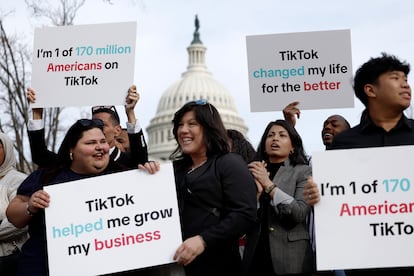TikTok and geopolitics
A bill to ban the Chinese social network in the United States opens a new chapter in the debate between freedom and security

The United States considers TikTok a threat to its national security and is willing to treat it as such. This issue ceased to be mere speculation when the House of Representatives — in a rare show bipartisanship in these times of extreme pre-election polarization (352 votes in favor and 65 against) — approved last week a bill that requires ByteDance, the Chinese company that owns TikTok, to sell the social media platform within six months. If it does not do so, TikTok will be banned in the U.S. The bill now begins its passage through the Senate, where it’s outcome is uncertain, but President Joe Biden has said he would sign it into law. There is currently no clear buyer for the platform, whose gigantic value has yet to be calculated, so the threat of a ban is very real.
In just seven years, TikTok has grown exponentially, reaching one billion users worldwide, 170 million of whom are in the United States. But unlike other internet giants, it is not American. The aggressive protectionist move comes after years of warnings in Washington about the connections between ByteDance and the Beijing government. The Chinese government has a board seat with ByteDance’s structure and, by law, operates under the regime’s principles. The suspicion that the data of half of the U.S. population (names, phones, location, cards and all kinds of personal preferences) could be accessed by a foreign power has grown as TikTok gained more and more ground in the U.S. market.
TikTok is also especially popular among young people and its very powerful recommendation algorithm — the average user spends an hour and a half a day watching videos — can also be a highway of misinformation. Also of alarm is the fact that the United States is in the midst of an election campaign ahead of the November presidential elections. As president, Donald Trump tried to implement a law like the one recently approved by the House, but was stopped by the courts. Now, aware that the controversy could be a major issue for young voters, he is questioning the TikTok ban.
TikTok is based in California and has always denied the accusation that it is subservient to Beijing. It has spent hundreds of millions of dollars lobbying Washington, but this message has failed to hit its mark. In recent weeks, TikTok even called on users to directly demand members of Congress oppose the measure.
The move in the United States has a precedent in India, which banned TikTok in 2020, also for national security reasons. The ban affected the 200 million TikTok users in India. The European Commission opened an investigation into the company, but in this case, for issues concerning advertising transparency and protection of minors. The strategic security argument, however, affects all Western democracies. Europe is no stranger to the global rivalry between the U.S. and China, even less so since the outbreak of the war in Ukraine. It would be advisable for European institutions to prepare — without prejudice — for a debate on the relationship between freedom and security that, sooner rather than later, could end up reaching Brussels.
Sign up for our weekly newsletter to get more English-language news coverage from EL PAÍS USA Edition
Tu suscripción se está usando en otro dispositivo
¿Quieres añadir otro usuario a tu suscripción?
Si continúas leyendo en este dispositivo, no se podrá leer en el otro.
FlechaTu suscripción se está usando en otro dispositivo y solo puedes acceder a EL PAÍS desde un dispositivo a la vez.
Si quieres compartir tu cuenta, cambia tu suscripción a la modalidad Premium, así podrás añadir otro usuario. Cada uno accederá con su propia cuenta de email, lo que os permitirá personalizar vuestra experiencia en EL PAÍS.
¿Tienes una suscripción de empresa? Accede aquí para contratar más cuentas.
En el caso de no saber quién está usando tu cuenta, te recomendamos cambiar tu contraseña aquí.
Si decides continuar compartiendo tu cuenta, este mensaje se mostrará en tu dispositivo y en el de la otra persona que está usando tu cuenta de forma indefinida, afectando a tu experiencia de lectura. Puedes consultar aquí los términos y condiciones de la suscripción digital.









































